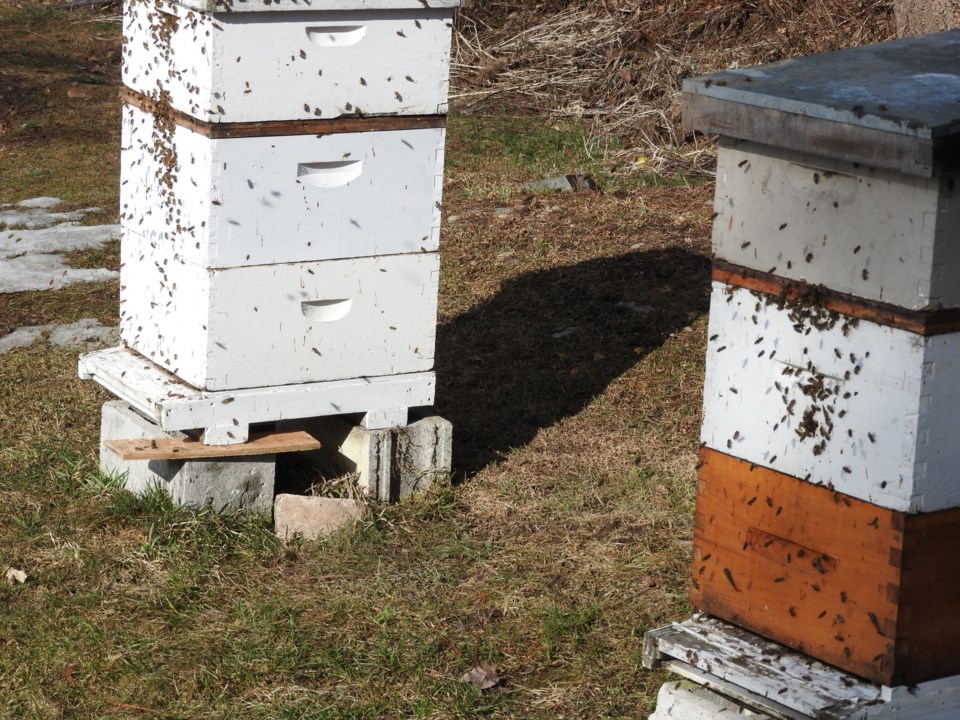Delores Franz Los became a beekeeper long before it was a buzzworthy pastime.
She first started over 40 years ago in Squamish, but has long since moved—along with her hives—to the furthest reaches of Pemberton Meadows. Over the years she’s hosted school groups, burgeoning beekeepers, and curious community members who were willing to make the trip.
“I’ve had many people over the years who want to start beekeeping come to my place to see the hives,” she said. “I thought, ‘Wouldn’t it be nice if there was something close to Pemberton—adults and kids could come down—with a place to keep a couple hives?’”
So, last summer, when nearby Meadowlands Farm (best known for its cranberries) came up with a unique way to give back to the community—offering up donations from their u-pick blueberries to local groups via grants—Los realized it was a perfect opportunity to get community beehives off the ground.
“I wrote up a proposal and they accepted,” she said. “I didn’t tell anybody about it until I actually got the equipment. In the fall, they brought me all the equipment you need for two hives. I have everything but the bees and the bees will come [this month].”
The next hurdle she had to overcome: Where exactly to put the new community hives. She knew she wanted a central location in Pemberton to make it as accessible as possible. So when she found out Nolan Den Duyf and Hannah Clark were starting a new vegetable and flower farm called Cold Creek Acres in the perfect location—close to both the high school and elementary school—she reached out.
It turned out to be a perfect match.
“This is going to be our first big season,” Clark said. “We knew that we wanted a lot of bio diversity and the farm to be super diverse and bees were going to be part of that. With getting everything started and trying to learn, we didn’t have the time to learn about bees. We were in the process of looking for someone to help us do that.”
With a public-access area carefully picked out—the farm is located at the corner of Urdal Road and Fraser Road, but the beehive access will be at the southeast corner along Fraser Road—and some equipment already on site (with paint donated from Pemberton Valley RONA after it found out about the project), the pair is looking forward to not only welcoming the community to their new farm, but also learning about bees themselves.
“We know little-to-nothing about bees currently,” Den Duyf said with a laugh. “We’re excited to get the full learning experience from Delores and get some training firsthand on how to maintain them.”
Adds Clark: “We’re pretty lucky this whole thing worked out the way it did. Being able to learn from Delores, she’s so knowledgeable about this stuff. When we’ve told people around town, they’re like, ‘oh, the bee lady!’ To learn from her is awesome.”
While there’s plenty of interest from the public in learning more about bees, that education has also become more pressing in recent years as the insects have been dying off due to disease.
“It’s harder and harder to raise bees and that’s why there’s a big focus on them,” Los said. “Sixty per cent of the food we eat, bees are necessary to pollinate.”
To that end, it’s both important and fulfilling to watch people—especially kids—learn more about them, she added.
“It’s absolutely incredible to see what happens,” she said. “I have Kindergarten kids and Grade 1 and 2, some will be very afraid when they first start; they’ve heard bees sting. Honestly, you can’t even imagine how quickly they change. They have hats with veils and gloves, so they look like beekeepers. Within minutes, their hands are in the beehive and they’re right in there.”
While Los will oversee the hives and the school and community visits, she hopes to recruit more volunteers.
“Eventually the hope is people who started learning about bees will say they feel comfortable enough to take others through the beehives, so they’re real, community beehives,” she says.
To find out more, email Los at [email protected].


